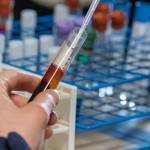Role of Coenzyme Q10 in Horse Nutrition

Coenzyme Q10 (CoQ10) plays a key role in mitochondrial function and is essential for the production of energy. CoQ10 is also a powerful antioxidant, capable of regenerating other antioxidants, such as vitamin E and vitamin C. In horses, certain forms of CoQ10 are absorbed well and supplementation has been shown to increase CoQ10 levels in serum and muscle.
Antioxidants protect cell membranes and support overall health. Specifically, antioxidants counter the effects of “reactive oxygen species,” also known as free radicals, which damage cell membranes. Free radicals may increase due to environmental factors, lack of antioxidants, or even as a natural response to exercise.
“Coenzyme Q10 is a naturally occurring substance that can be used to enhance both aerobic metabolism and antioxidant activity,” explained Joe Pagan, Ph.D., president and founder of Kentucky Equine Research. “We’re studying this intensely now, and we think it has a big place in performance horse nutrition.”
Based on the results of ongoing studies into CoQ10 at its Thoroughbred Performance Center in Ocala, Florida, Kentucky Equine Research has developed Nano-Q10, a highly bioavailable form of CoQ10.
“Our research, in collaboration with Dr. Stephanie Valberg from Michigan State University, demonstrated that Nano-Q10 supplementation promotes oxidative metabolism in skeletal muscle by increasing mitochondrial oxidative enzymes in conjunction with decreasing glycolytic enzymes,” Pagan said. “Proteomic analysis of muscle from 13 Thoroughbreds supplemented with Nano-Q10 showed upregulation of 13 mitochondrial proteins and downregulation of 9 glycolytic enzyme proteins.”
“There’s an issue in Thoroughbred racehorses that seems to be associated with high levels of a specific enzyme in the blood called GGT,” Pagan said. “We have some theories on what might cause this in certain horses—we think it may be related to oxidative stress—and it seems Nano-Q10 may be effective in reducing some of the problems we’re seeing. Our preliminary research with our racehorses in Florida suggests that horses with higher serum CoQ10 have lower GGT.”
Other research teams have proposed reproductive benefits of CoQ10 supplementation, including better sperm motility in cooled semen and improved cryopreservation of semen from stallions with poor freezing ability.*,** Researchers have identified the potential benefits of CoQ10 during the storage of stallion sperm at ambient temperatures.+ One study provides direct evidence that CoQ10 supplementation helps subfertile stallions.++
While many of the potential benefits of CoQ10 supplementation are not fully understood, the compound undoubtedly has strong antioxidant properties, which could benefit sport horses and breeding stallions.
If you’d like to discuss the benefits of including a coenzyme Q10 supplement, such as Nano-Q10 from Kentucky Equine Research, in your horse’s nutritional program, contact a nutrition advisor today.
*Nogueira, B.G., B.F.B. Sampaio, M.I.L. Souza, E.V. Costa e Silva, and C.E.S.N. Zuccari. 2015. Coenzyme Q10 and alpha-tocopherol prevent the lipid peroxidation of cooled equine semen. Reproduction in Domestic Animals. 50(6):1003-1010.
**Carneiro, J.A.M., I.F. Canisso, R.S. Bandeira, et al. 2018. Effects of coenzyme Q10 on semen cryopreservation of stallions classified as having good or bad semen freezing ability. Animal Reproduction Science. 192:107-118.
+Gibb, Z., and R.J. Aitken. Recent developments in stallion semen preservation. 2016. Journal of Equine Veterinary Science.43:S29-S36.
++Ruiz, A.J., A. Tibary, R.A. Heaton, et al. 2021. Effects of feeding coenzyme Q10-ubiquinol on plasma coenzyme Q10 concentrations and semen quality in stallions. Journal of Equine Veterinary Science 96:103303.








